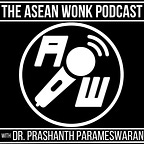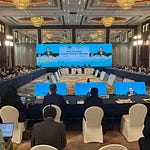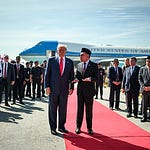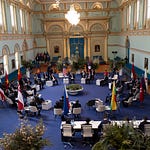[Note: This is the free preview within the dedicated podcast section of the ASEAN Wonk website, with the full version in a post published on October 30, 2025 available to our paying subscribers. This is not meant to serve as new content and is part of our free preview content within the dedicated website podcast section].
INTRODUCTION
ASEAN Wonk: Welcome to the ASEAN Wonk Podcast where we bring you expert insights and regional perspectives on Southeast Asia and Indo-Pacific geopolitics and geoeconomics. I’m your host, Dr. Prashanth Parameswaran. And if you haven’t already, do make sure you’re subscribed to the ASEAN Wonk platform at www.aseanwonk.com so you don’t miss any of our full posts.
Our guest today is Dr. Vannarith Chheang, who is speaking in his personal capacity and has a variety of affiliations, including as chairman of the advisory council for Cambodia’s National Assembly and Angkor Social Innovation Park. He has nearly two decades of experience serving in various roles including as a consultant for the Asian Development Bank and the UN. We’ll start our conversation talking through contemporary developments, including scam centers and the Thailand-Cambodia border war. Stay tuned as we talk through a range of other subjects, including ASEAN; Cambodia’s strategies as a small state amid U.S.-China competition; and what to expect in foreign policy into 2026.
Note: The transcript that follows the above free clip preview has been lightly edited for clarity and organized into sections for ease of quick browsing. For all ASEAN Wonk Podcast episodes, full video and audio podcasts, along with edited and sectioned transcripts as well as block quotes, will be a premium product for our paying subscribers, but we will include a short free transcript preview and a clip for all readers to maintain accessibility. Paying subscribers can find the rest of the full transcript and the full video podcast right below the paywall. If you have not already, do consider subscribing, and, if you have already done so and like what you see and hear, do consider forwarding this to others as well who may be interested. Thank you for your support as always!
FINDING BALANCE BETWEEN MAJOR POWERS
ASEAN Wonk: So welcome to the podcast, Vannarith. I wanted to start with your assessment of where Cambodia’s foreign policy is. We’ve passed the two-year mark when Hun Manet transitioned to prime minister. Obviously, Hun Sen continues to play an important and influential role. Back in 2019, you wrote an article asking: can Cambodia’s foreign policy find its feet? If you look at the events in the past two years – looking at some of the tensions that Cambodia has had with its two larger neighbors, Thailand and Vietnam, something that’s been recurring in its history, but also some of the interesting developments in its ties with the United State with the second Trump administration, how would you assess Hun Manet’s foreign policy from a Cambodian perspective?
Dr. Vannarith Chheang: I think Hun Manet’s foreign policy shows robustness and proactiveness in engaging regional and international actors. But the principle – the core principle – the core interests and objectives are there. It’s more continuity of the previous kind of generational leadership, but with more nuances and dynamism. If you look especially at Cambodia’s relations with major powers – the United States and China – and middle powers like Japan, Australia, France and India, very dynamic. And, likely, I think they could conclude a strategic partnership with France next year and also with Australia. So if it becomes real, then Cambodia have expanded its strategic partnership to include five. Currently, we have three: comprehensive strategic partnership with China, comprehensive strategic partnership with Japan, and lately with Korea, and as well as Thailand, actually. And if next year, we have two or three more, if India can be realized next year, so we have seven six or seven. So that is a diversification of strategic partnership that I think the new government trying to achieve in order to improve its independence as well as agency in foreign policy.
“[I] think they could conclude a strategic partnership with France next year and also with Australia. So if it becomes real, then Cambodia have expanded its strategic partnership to include five.”
LESSONS FROM THAILAND-CAMBODIA BORDER WAR
ASEAN Wonk: A good reminder of the range of major powers that are important in Cambodia’s foreign policy as well. I wanted to zoom in a little bit on Cambodia’s two front border management with its immediate neighbors – which is Thailand and Vietnam – the two bigger neighbors – a recurring theme in Cambodia’s history. If you zoom out a bit, it looks like it’s been a pretty challenging two years. Last year, we had the CLV withdrawal and the Funan Techo Canal with Vietnam. This year, we’ve had the border row with Thailand reemerging as well in the headlines: Thaksin is now in jail, and we also have a new Thai prime minister. You’ve written in the past about thinking through Cambodia’s foreign policy as a calibration between different factors, including national unity and strategic communications. How do you assess Cambodia’s approach so far? If we can maybe use the Thailand-Cambodia border tensions as an example, how has the government been doing and what perhaps could it do better or do more in that perspective in terms of managing these tensions?
Dr. Vannarith Chheang: Yeah. Since the decline of the Khmer Empire in the fifteenth century, so now over six hundred years, Cambodia has been sandwiched by two big neighbors. It’s not easy to manage our neighborly relationships – ups and down, hate and love, sweet and sour relationship – and the very unfortunate latest development is armed conflict with our neighbor, Thailand. It is much bigger than what we experienced back in 2008 and 2011. And this is cshocking and a surprise to all Cambodians: we never expected to see this kind of massive large-scale kind of armed confrontation. Because as a small state, I think Cambodia needs to navigate through all these challenges. First of all is to build peaceful relations with a bigger neighbor. We have no choice, but we have to try to find some ways to live peacefully with neighbor. And, of course, during this time of difficulties and challenges, I think, as a small state, we need to build a strong national consensus with better strategic communication to tell our stories. But, in reality, I think we don’t have much platform to tell our Cambodian story because all the international media are based in Bangkok anyway. So during the conflict, so most of media, they reported from Bangkok. So it’s it’s kind of a one-sided story.
But this is a lesson learned that as a small state, we need to have more effective strategic communications to tell our story and also to have more international friends and partners that share our interest and our vision. And in this regard, I feel we have learned from this confrontation with the role of ASEAN. So Cambodia now believes strongly in ASEAN because without ASEAN, the armed conflict may have been prolonged for another month or two months or even until now, and a lot of casualties and human suffering may occur. But I must say that ASEAN has done a pretty good job, pretty well in this regard with the support, of course, from the United States and China. So this is something that as a small state, we rely on diplomacy and on multilateral institutions like ASEAN and, of course, international law because Cambodia have filed a case to the International Court of Justice in June. But, of course, Thailand have never accepted the ICJ rulings.
ASEAN VALUE AND LIMITATIONS AMID INTRAREGIONAL TENSIONS
ASEAN Wonk: You mentioned the role of ASEAN and its importance for smaller countries like Cambodia. And of course ASEAN has its own limitations operating as a consensus-based organization on issues like the South China Sea and Myanmar. But I was interested in what you said a little bit earlier that this is different from what we’ve been seeing in terms of the border tensions that have arisen in the recent past between Thailand and Cambodia. Could you maybe elaborate about contrast within the wider regional context?
Dr. Vannarith Chheang: With regard to Cambodia-Thai relations and the role of ASEAN, ASEAN have been implementing what we call the ASEAN Way with the principle of non-interference. Actually, in 2008 Cambodia requested ASEAN chairmanship at that time in Singapore to interfere into our bilateral tensions with Thailand. But, of course, it did not bring any concrete resolutions. And then, again, 2011, during that time is Indonesia was the chair of ASEAN, and Indonesia foreign minister Marty Natalegawa, he’s very active so he engaged more actively and managed to cool down the tensions and restore peace and normalcy. And Indonesia even offered to send peacekeeping forces at that time. Thailand did not accept the offer, Cambodia was willing to accept the offer. And now, Malaysia as the chair. So I think the role of the chair is very important: who is chairing ASEAN really important in this providing good offices to manage the crisis or resolve the crisis between the two member states.
From Cambodia’s perspective, this is not a violation of the noninterference principle because the Cambodia-Thailand border conflict affects regional peace and stability. So it is a regional issue. And, of course, it’s not the intention of Cambodia to internationalize the bilateral conflict, but that is a matter of moral responsibility and a matter of necessity for ASEAN for a stabilized region because that is the role of ASEAN to maintain peace and stability. So Cambodian understanding of this is different from Thailand, and Thailand tends to view it as a violation of non-interference principle. And Thailand, 2008, 2011, and even now, they are reluctant to get ASEAN involved in this.
TACKLING THE GLOBAL SCAMDEMIC CHALLENGE
ASEAN Wonk: Yeah. As we both know, we do see this recurring theme where smaller countries are more comfortable using multilateral institutions and international law as a source of support and larger countries – not just in Southeast Asia – tend to use those tools less. One other issue that has come up is this challenge of giant scam centers that are proliferating across Southeast Asia and the world. Interpol’s done an assessment and said that more than a third of the world’s countries now have victims related to these scam centers. Cambodia is one of those places where you have seen attention to these scam centers operating, in addition to others like Myanmar, for example. We all know some of problems and challenges here are structural – why people fall for these scams, some of the vested interests and political interests that underlie this and so on. From a Cambodian perspective, how do you assess how Cambodia has been approaching this so far? And what perhaps can it do better or more of in this regard? Because this is a challenge that is global. Everyone needs to play a role.
Dr. Vannarith Chheang: I think you’re right. This is a global issue, and we need a global cooperation to address this. So no single country can deal with this issue alone. Cambodia has shown political will over the past two years or so because it is a new issue that Cambodia is facing. Actually, in the beginning, some of the leaders found it difficult to differentiate between online gambling and online scamming. I think now they understand better the differences between these two issues: online scamming is cheating online, and the impact is much more widespread than online gambling. But I think we need to understand this very complex and difficult issue, and it’s kind of organized crime now, right? Very sophisticated and they are very well managed. They know how to manipulate all of these weak governance systems across the region and different parts of the world. And this is something that I think Cambodia needs to have close cooperation with neighboring countries in ASEAN. And now I think the US has been very active in supporting Cambodia in fighting against online scamming by sharing information and capacity building. Now Singapore is also very active in this regard, which is good. We have to have each other to fight against online scamming.
“Very sophisticated and they are very well managed. They know how to manipulate all of these weak governance systems across the region and different parts of the world.”
But I think complex vested interest groups, rent-seeking behavior, this kind of vague, relatively weak enforcement mechanisms give room to all this organized crime to operate. And several countries in Southeast Asia have become centers. Now Philippines is also having this problem. It’s a growing issue now in the Philippines because some of the organized crime shifted to the Philippines after having been cracked down here in Cambodia and Thailand. So Cambodia and Thailand have been working quite hard in the past six or seven months or so to crack down on this, but still, I think a lot of work needs to get done. We need the support from everyone in order to fight against this.
BETWEEN TRUMP AND XI IN GREAT POWER DYNAMICS
ASEAN Wonk: One of the other issues is navigating ties between the United States and China. We have the Trump administration’s actions so far this year; China’s own actions including the hosting of the Shanghai Cooperation Organization summitry in Tianjin where Prime Minister Hun Manet was present and met with President Xi Jinping; and also U.S. and China involvement in the management of Thailand-Cambodia border tensions. Cambodia is also coordinator for U.S.-ASEAN relations. How do you see Cambodia adjusting to these changing US China dynamics, and how do you assess its ties right now with both the United States and China?
Dr. Vannarith Chheang: I think…
[Note: This is the end of a free preview podcast, with the full version in an earlier post published on October 30, 2025 available to our paying subscribers. This is not meant to serve as new content and is part of our free preview content within the dedicated website podcast section].










